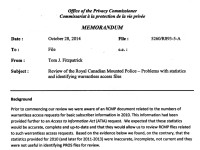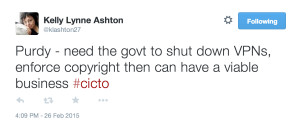Yesterday I appeared before the Standing Committee on Industry, Science and Technology to discuss Bill S-4, the Digital Privacy Act. The discussion focused on a wide range of concerns, including the shortcomings in the security breach disclosure rules and the need for greater enforcement powers for the Privacy Commissioner of Canada. Metro News covered the appearance. My opening remarks are posted below. I’ll link to the full transcript once available.

Wiertz Sebastien - Privacy by Sebastien Wiertz (CC BY 2.0) https://flic.kr/p/ahk6nh
Privacy
Why Watching the Watchers Isn’t Enough: My Talk on Privacy, Snowden & Bill C-51
Last month, I had the honour of speaking at the Pathways to Privacy Symposium, a privacy event sponsored by the Privacy Commissioner of Canada and hosted by the University of Ottawa. The event featured many excellent presentations (the full seven hours can be viewed here). My talk focused on the recent emphasis on the need to improve oversight, a common refrain in reaction to both the Snowden surveillance revelations and Bill C-51, the anti-terrorism bill. While better oversight is necessary, I argue that it is not sufficient to address the legal shortcomings found in both Canada’s surveillance legislation and Bill C-51. The full talk (which unfortunately has slightly delayed sound) can be viewed here or below.
Secret Memo Reveals RCMP Records on Requests for Subscriber Data “Inaccurate and Incomplete”
Last fall, Daniel Therrien, the government’s newly appointed Privacy Commissioner of Canada, released the annual report on the Privacy Act, the legislation that governs how government collects, uses, and discloses personal information. The lead story from the report was the result of an audit of the Royal Canadian Mounted Police practices regarding warrantless requests for telecom subscriber information.
The audit had been expected to shed new light into RCMP information requests. Auditors were forced to terminate the investigation, however, when they realized that Canada’s national police force simply did not compile the requested information. When asked why the information was not collected, RCMP officials responded that its information management system was never designed to capture access requests.
While that raised serious concerns – the RCMP has since promised to study mechanisms for reporting requests with recommendations expected in April – my weekly technology law column (Toronto Star version, homepage version) reports that documents recently obtained under the Access to Information Act reveal that the publicly released audit results significantly understated the severity of the problem. Indeed, after the draft final report was provided to the RCMP in advance for comment, several of the findings were toned down for the public release.
Rogers Executive Calls on Canadian Government to Shut Down VPNs
The Content Industry Connect conference, which was held in Toronto yesterday, featured a panel of leading television executives from Bell, the CBC, Corus, Rogers, and Shaw Media. Several people were live-tweeting the event when a comment from Rogers Senior Vice President David Purdy caught my eye. According to Kelly Lynne Ashton, a media policy expert, Purdy called on the Canadian government to shut down the use of virtual private networks:
Citizen Four and the Canadian Surveillance Story
Citizen Four, Laura Poitras’ enormously important behind-the-scenes documentary film on Edward Snowden, won the Academy Award last night for best documentary. The film is truly a must-see for anyone concerned with privacy and surveillance. It not only provides a compelling reminder of the massive scale and scope of surveillance today, but it also exposes us to the human side of Snowden’s decision to leave his life behind in order to tell the world about secret surveillance activity.
Canada is not mentioned in the film, but that is not because we have been immune to similar surveillance activity. In the months since the Snowden revelations began, there have been many Canadian-related stories including reports on G8/G20 spying, industrial spying in Brazil, the “airport wifi” surveillance program, and the massive Internet download surveillance program.












